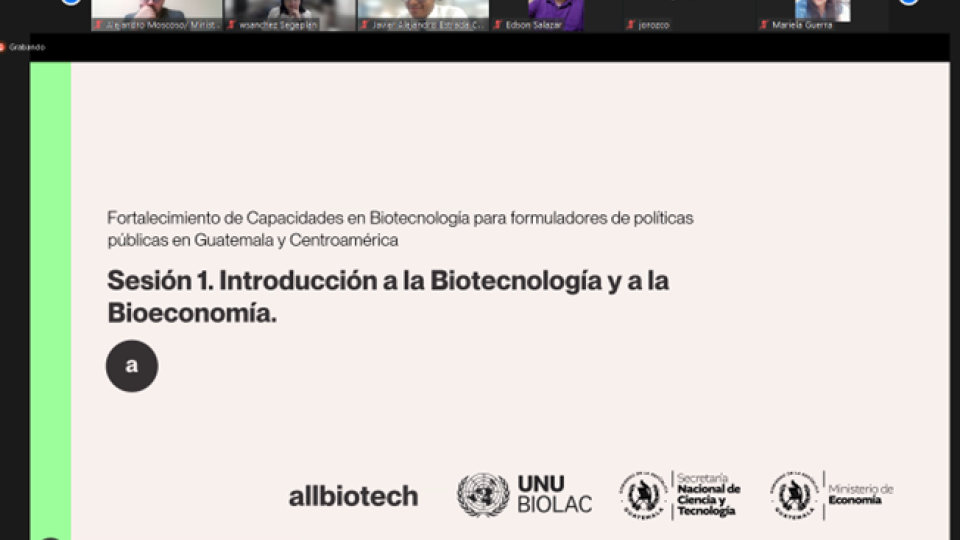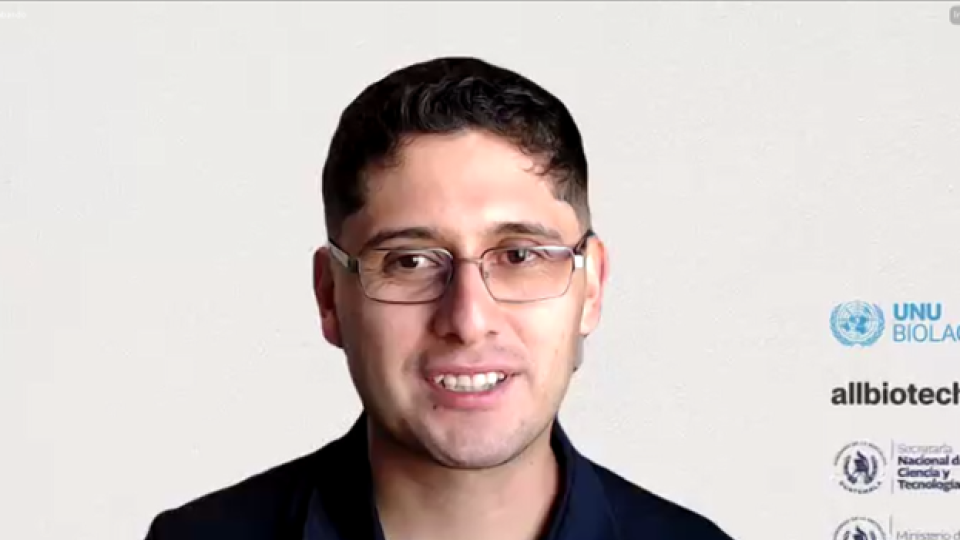Biotechnology is driving a global biorevolution, offering innovative solutions to challenges such as climate change, food security, and health. Latin America and the Caribbean (LAC) possesses a unique opportunity to lead in this transformation by leveraging its rich biodiversity. Achieving this potential, however, requires well-informed decision-makers equipped to promote responsible, safe, and ethical development.
To address this crucial need, a specialized Capacity-Building Program for Policymakers in Emerging Biotechnologies was designed as an initiative by Allbiotech and the Biotechnology Program for Latin America and the Caribbean of the United Nations University (UNU-BIOLAC). The objective of this collaboration is to raise awareness and strengthen policymakers' capacity, providing them with the necessary tools to understand and evaluate emerging biotechnologies in an informed manner. Allbiotech, a nonprofit organization, focuses on catalyzing biotechnology development in the region, while UNU-BIOLAC champions the ethical and responsible use of biotechnology to enhance human well-being and contribute to the Sustainable Development Goals (SDGs). The program, which utilizes an interdisciplinary approach, featured facilitators such as Daniel Domínguez (from Allbiotech) and Luis Ventura Martínez, who addressed decision-makers using a technical-scientific approach.
Program Implementation and Success
The core intention of the program is to promote informed decision-making based on scientific evidence and encourage the design of public policies that foster responsible and safe development. A fundamental pillar of the activity is fostering Bioliteracy, which refers to the ability to critically evaluate and apply biotechnology and bioeconomy concepts while considering their social, ethical, economic, and environmental implications.
The program structure typically includes virtual seminars covering topics like Bioeconomy, Synthetic Biology, Gene Editing, and regulatory landscapes, often followed by an in-person workshop focused on collaborative strategy definition.
- Mexico (January–February 2024): The original workshop, titled "Introduction to Biotechnology and Genome Editing," was held remotely for public policy decision-makers, primarily legislators and technical support personnel. This edition successfully provided policymakers with a basic understanding of gene editing technology and its scope, allowing them to make informed decisions.
- Guatemala (2024): This adaptation, supported by SENACyT and the Ministry of Economy, engaged 45 public officials from 15 government agencies. Key outcomes included increased knowledge and awareness, strengthened collaboration networks among key stakeholders, and, significantly, the initiation of discussions toward a National Bioeconomy Strategy. Participants actively defined guiding principles and priority areas for Guatemala’s transition toward a sustainable bioeconomy.
- Panama (June 2025): An integrated program, carried out with the collaboration of SENACyT and SNI, focused on strengthening capacities in bioeconomy for policymakers. This training is considered essential for the creation of the National Bioeconomy Starategy of Panama (ENBP), aiming to improve decision-makers' capabilities in bioeconomy, biotechnology, and emerging biotechnologies.
Key Products and Deliverables
The impact of these capacity-building efforts extended into tangible resources for policy design:
- Mexico: The program produced the document "Recomendaciones para el diseño e implementación de políticas públicas para el desarrollo de la edición de genomas en México".
- Guatemala: Following the intensive workshop, the groundwork was laid for advancing strategies. A set of recommendations was generated for strengthening the transition towards a sustainable bioeconomy, documented in the "Recomendaciones para el diseño e implementación de políticas públicas para el desarrollo de la edición de genomas en Guatemala". These recommendations address critical areas such as defining strategic priorities, promoting scientific literacy, and updating regulatory frameworks.
Future Perspectives: Expanding Regional Impact
The successful implementation and proven model in Mexico, Guatemala, and Panama demonstrate the program's vital role in equipping public officials and establishing stronger regional collaboration networks. The continuous expansion of these initiatives underscores the importance of fostering Bioliteracy among decision-makers across Latin America to ensure that the region can effectively leverage its biodiversity and accelerate the transition toward a sustainable bioeconomy. These capacity-building seminars are designed to be re-edited and implemented throughout the region to ensure policymakers throughout Latin America and the Caribbean can integrate biotechnology into public policy design, addressing common challenges in agriculture, health, and the environment.


